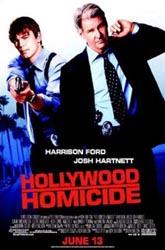 Director: Starring: Release: 4 Apr. 03
|
Levity BY: DAVID PERRY Manuel Jordan (Thornton) doesn’t want to leave prison after 22 years of incarceration because he still has relieved the guilt of killing a 17-year-old in a botched convenience store robbery. For him, live in prison is barely enough to make up for his sins, and would be more than happy to continue on this punishment instead of going back to the real world on time served. Regardless, the parole board gives lets him out and the rest of the audience begins the punishment of watching a man mope for nearly two hours over personal anguish that never holds true of becomes in the least interesting. Levity -- as the film is titled, though its attempt at irony comes closer to idiocy -- is built on contrivances like the criminal with a guilty conscience and the reverend without a moral foundation. When the film actually pits Manuel with Adele Easley (Hunter), the sister of his victim, and then tries desperately to make it seem understandable that she enters a romantic relationship with a man who (a) she barely knows, (b) seems to be withholding some deep secret, and (c) looks like a white-miened Neil Young. There are greater sins perpetrated by director-writer Ed Solomon in Levity than simply killing a kid. His is of the most egregious forms of indie film damnation -- it is built on the pretty images (courtesy of cinematographer Roger Deakins) to convey lovey-dovey liberal messages of communal coexistence, racial harmony, and criminal rehabilitation while never stepping back to notice how ridiculous the whole endeavor is. This is not to say that liberal messages have no place in cinema, but one is more likely to support the conservatism after being as dowdily pandered to as happens in films like Levity. This is not simply the pitiful gestations of Solomon, who is evidently trying to convince people that he has more in him than simply Bill and Ted and Men in Black films, but of a cast that seems to want to do something with material that might be the worst they’ve encountered in their careers. Thornton is running an approximation of his The Man Who Wasn’t There character, without the baggage of a meaningful scenario to give it purpose; Hunter has played this well-meaning lover/mother character before in better films like Jesus’ Son; Kirsten Dunst, who comes into this film in a drug-induced haze and never fully turns it off even when the character is sober, is a good actress but one burdened by a Hollywood more interested in her unusual beauty than in her acting, a philosophy that seems to be shared by this film’s casting crew (although under their indie banner, Sony, the makers of Spider-Man, still bankrolled the film); and Morgan Freeman, as the great black hope, garbles his dialogue in a performance that makes Dreamcatcher seem utterly brilliant. Levity is the
sort of film that confuses foreshadowing with nimble storytelling, and
features contrivances as originality. The discussions Miguel has with the
imagined ghost of his victim, I suppose, are meant to carry some great
meaning to the needed forgiveness of this character. But this never sits
well with me -- it feels much more like a screenwriter imagining his own
characters as sole-searching Jesus figures with a horrible case of a
Sartrean Napoleonic Complex. Moody and unconditionally ugly, this is a film
that remains pretty to look at but vacant to consider. Miguel may finally
get that forgiveness from the people who really matter, but for those forced
to sit through his unbearable grumbling, getting the forgiveness of the
audience may be a much tougher struggle. |
|
| ©2003, David Perry, Cinema-Scene.com, 6 June 2003 | ||




